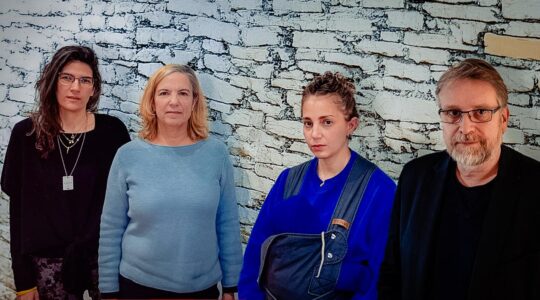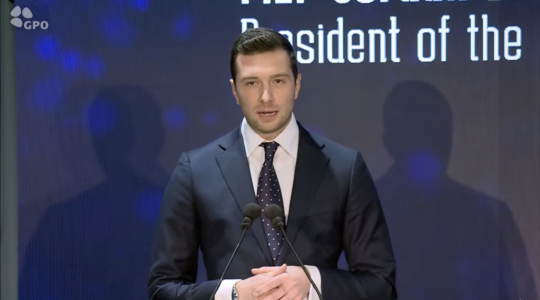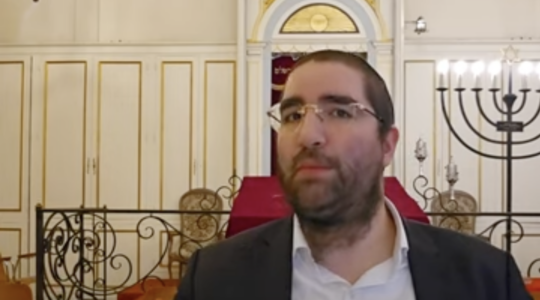ODESSA, Ukraine (JTA) — Six years ago, Chaim Chesler’s plan to bring the Limmud educational model to the former Soviet Union was met with a chorus of naysayers.
“Everyone said I was nuts, they’re not ready for it,” Chesler recalls.
Today, Chesler, the founder of Limmud FSU and chairman of its executive committee, oversees an organization with an annual budget of approximately $1 million that operates in seven countries and can hardly keep up with the demand for its services.
Launched in the United Kingdom in 1980, Limmud has exploded in recent years. Dozens of countries have adopted its educational model, which is now seen as one of the world’s most successful Jewish initiatives and a potent means of identity building.
But perhaps nowhere has the growth been as staggering as in the former Soviet states. With their substantial Jewish population and limited supply of innovative Jewish programming, demand for Limmud programming there has been significant.
This year alone, Limmud FSU held events in Moscow and St. Petersburg, and Odessa and Vinnitsa in Ukraine, as well as in Beersheba, Israel. Plans are in place to expand to Moldova, the Carpathian Mountains and potentially Irkutsk in eastern Siberia.
Limmud FSU is the only Limmud operation that runs programming outside its geographic region for Russian-speaking Jews who reside elsewhere. The organization is operating in two Israeli cities, Ashkelon and Beersheba, home to large communities of Russian Israelis, and in Russian expat communities in the United States. And plans are in the works for more.
“It’s something that I didn’t even dream,” Chesler said.
Stressing openness and equality between lecturers and participants, Limmud offers a whirlwind array of workshops, film screenings, performances and lectures. At the most recent Limmud FSU conference, which concluded here earlier this week, options included everything from pottery to American Jewish music to the future of Jewish communities in Eastern Europe.
Roman Kogan, Limmud FSU’s chief operating officer, said the conferences are an important educational and intellectual outlet for young Russian-speaking Jews who have aged out of programs offered by groups such as Hillel and Taglit-Birthright Israel.
“People are grown up and they are successful, and they want to do something by themselves and for themselves,” Kogan said. “And this is the only model that we have.”
As the former head of the Jewish Agency for Israel’s delegation to the former Soviet Union, Chesler says he was struck by the lack of control that Russian-speaking Jews had over their Jewish lives.
“Everything was from the top down … everything was telling them what to do,” he said. “What they wanted was to do something of their own.”
Greg Schneider, the executive vice president of the Claims Conference, attended the Odessa event and led a lively question-and-answer session with about 20 participants. The Claims Conference, which supports educational initiatives relating to the Holocaust, is one of Limmud FSU’s partners. Schneider said Limmud FSU’s rapid growth is an opportunity to cement a new Jewish audience’s commitment to memorializing the Holocaust.
“The explosion in interest comes from the fact that you’ve got a whole cohort of young Jews who don’t have a venue to explore their Jewish identity,” he said. “What we’re so excited about is that it’s clear that this group of people is starving, yearning to learn more about the Shoah and about the survivor community in the world.”
Limmud FSU frequently receives requests for conferences to be held in new cities; recent inquiries have come from Uzbekistan, Toronto and Kaliningrad, Russia. The organization plans an expanded outreach effort in the United States, beginning with an event next year on Albert Einstein at Princeton University and a conference in the Carpathian Mountains on the Baal Shem Tov, the founder of Chasidism. Further in the future, Chesler wants to develop a conference on the works of Marc Chagall and host an event in Irkutsk.
Such thematic orientations are not typical of Limmud conferences, but in the FSU it has become common practice. The Ashkelon event was about space exploration. Odessa marked the 20th anniversary of diplomatic relations between Israel and Ukraine.
“The Russians are very creative and independent, and they have their own culture and destiny,” Chesler said. “They take the model of Limmud, but they have their own flavor because they’re crazy — they want Sholom Aleichem, they want space.”
Watching an audience of hundreds bop to Hebrew songs performed by Russian superstar Andrey Makarevich inside a cavernous hall at the Odessa seaport, or break into an impromptu hora during a concert at one of the city’s most popular clubs, it’s hard to believe that the Odessa conference almost didn’t happen.
Limmud FSU had intended for the year’s only Ukraine conference to be the Vinnitsa event, which focused on the Holocaust; an Odessa conference had been held just last year. But Kogan said the demand from Vinnitsa participants for a repeat performance in Odessa was so great that organizers could not resist.
“We started just with one conference a year and now we have six to seven,” Kogan said. “The source is the energy that comes from the people. This is the only project that they rule, they lead. They just want us to help them.”
JTA has documented Jewish history in real-time for over a century. Keep our journalism strong by joining us in supporting independent, award-winning reporting.






